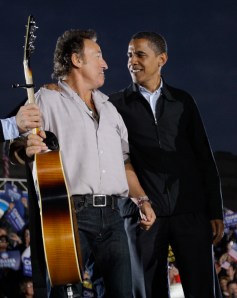Writer Marc Dolan writing in Politico Magazine Thursday has raised an interesting point about the legacy of Bruce Springsteen. The liberal singer who has long championed the plight of the working man may never have been taken seriously by the pop-culture political elite if not for the Gipper himself, President Ronald Reagan.
Videos by Rare
As a child raised in a conservative Jersey Shore town, single-digit miles away from the haunts Springsteen made famous, the general feeling about Springsteen was overwhelmingly positive. Many viewed the Freehold Borough boy as a classic example of local kid ‘done good,’ while others — most notably the parents of many of my peers — enjoyed a good Springsteen tune but would often say “I liked him more before he got political.”
Growing up as a politically apathetic teenager, I couldn’t hear the anti-Vietnam message in “Born in the USA”, nor the tales of working-class poverty spread throughout his “Nebraska” album. As Dolan examines in Politico, this inability to separate the man from the music isn’t uncommon, though the lines became a little obscured when Ronald Reagan began invoking the aforementioned “Born in the USA.”
It was at this moment in 1984 that Springsteen had a choice. While he is known now for his political message, at the time he remained increasingly politically distant. When Reagan promoted Springsteen’s record, he did so not through the songs themselves but through the man writing them.
“America’s future rests in a thousand dreams inside your hearts. It rests in the message of hope in the songs of a man so many young Americans admire — New Jersey’s own, Bruce Springsteen,” he told a crowd in Hammonton, New Jersey.
Springsteen, in the midst of one of the most famous tours in music history, could have shied away from the president’s endorsement. Over time, as Dolan writes, Springsteen used the words that Reagan praised him for and let his true emotions shine through. After Reagan spoke about Springsteen and used “Born in the USA” as an election rallying cry, the singer began to change. His lengthy monologues in between songs became a little more biting.
At tour stops around the country, he started collecting food to help local shelters and food banks. He began to refute the notions of Reagan, letting his audience know that the skinny kid from Freehold was still one of them — not one of the establishment.
In the days following Reagan’s initial endorsement, Springsteen addressed the conflicting nature of their political allegiances, calling out the president for attempting to co-opt what was then the hottest record in the country.
“Well, the president was mentioning my name in his speech the other day … and I kind of got to wondering what his favorite album of mine must’ve been, you know? I don’t think it was the “Nebraska” album. I don’t think he’s been listening to this one.”
Slowly but surely, songs like “Johnny 99” — one of the more rollicking politically charged songs you will ever hear — began popping up at Springsteen shows. Decades later, songs like “Ghost of Tom Joad” and “American Skin (41 Shots)” would join “Johnny 99” as live reminders that within the kid from Jersey was a political thinker with something to say.
As Dolan writes in Politico, throughout all of this, Springsteen rarely if ever firmly endorses a candidate — letting his personal ideals weigh more than any one candidate.
“Whatever his ideological beliefs, Bruce Springsteen is not a creature of party. He’s a democrat — lowercase ‘d’,” Dolan writes.
In the years since the Reagan endorsement, Springsteen’s songs have been used by numerous candidates on both sides of the aisle, including Secretary of State John Kerry, during his ill-fated presidential run, and President Barack Obama.
As an incoming freshmen in college, I found the appeal of Springsteen’s music through politics. Having been raised in a conservative household, I knew I was probably destined to vote Republican in the 2008 election. Yet, as an open-minded youth, there was still a chance I could evolve into a Democrat.
I saw Bruce Springsteen at several Obama rallies in 2008 and was disenchanted with the words of the candidate but still enthralled with the music of my hometown’s hero. At these rallies, I witnessed scores of young people flocking to see both men standing together, arms clasped, cheering along their shared vision for the U.S.
Finally, after decades, Springsteen was truly embracing his Democratic political roots — and embracing a candidate he could believe in.
Without Reagan, he never would have gotten there.



